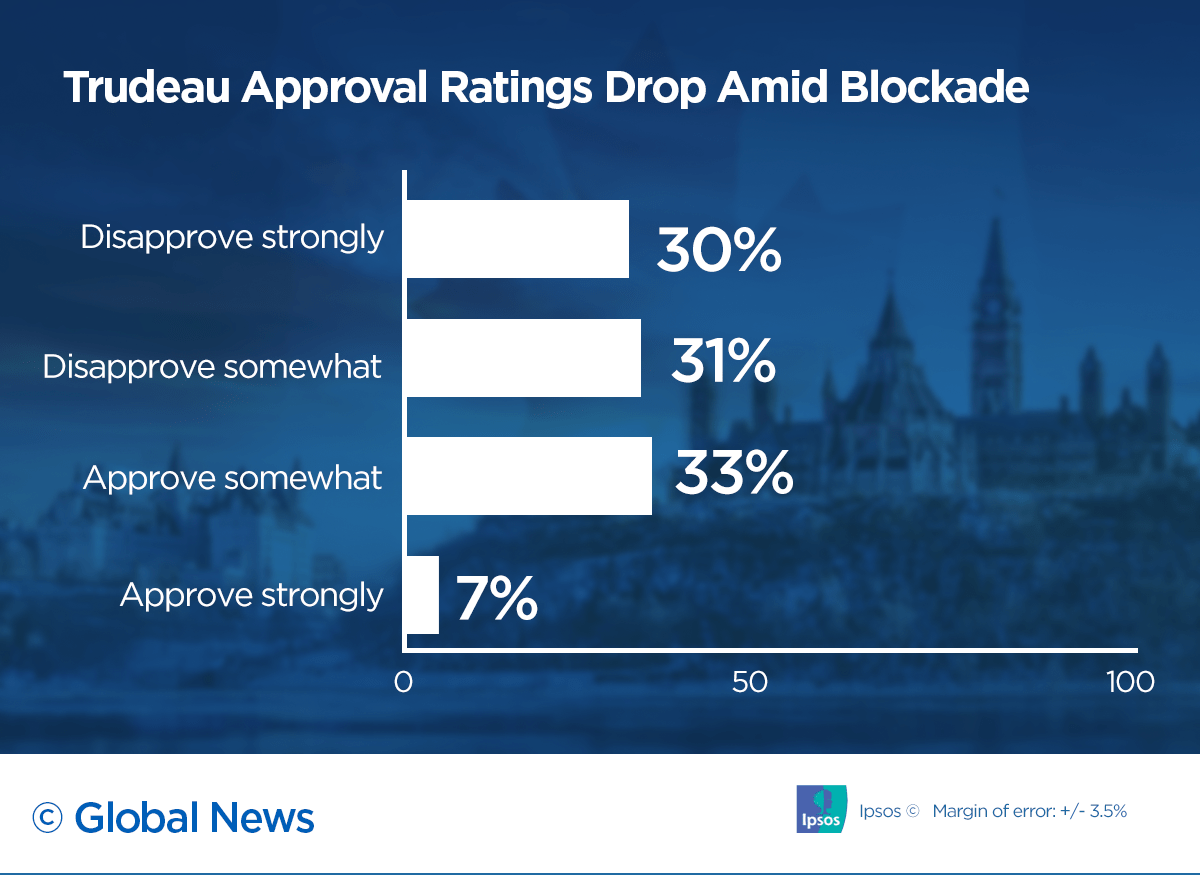Most Canadians do not approve of Prime Minister Justin Trudeau‘s government and how ongoing nationwide blockades in solidarity with the Wet’suwet’en Nation have been handled so far, a new poll suggests.

According to an Ipsos poll done for Global News, 60 per cent of Canadians do not approve of the current government and 62 per cent say the same about protests that have intermittently blocked rail lines, roads, border crossings and access to government buildings for almost a month.
Forty per cent say they approve, which is down three points from last week and five points since the fall election.
The protesters have said they are acting in solidarity with Wet’suwet’en hereditary chiefs who oppose a natural gas pipeline set to be built through their traditional territory in B.C., even though elected band councils along the route have approved construction.
READ MORE: Wet’suwet’en councillor calls for inclusive decision making for proposed deal
But as the blockades continue, Canadians are showing something unusual — consensus on the need for intervention.
- Queen’s University students stranded in Doha after Iran attack shuts down airspace
- Khamenei’s death met with ‘jubilation’ among Iranian-Canadians: Liberal MP
- Attack on Iran triggers global flight disruptions, impacts Canadian travellers
- ‘At first I cried’: How Iranian Canadians are reacting to the U.S. strikes in Iran
“This is a rare thing we see in Canadian politics these days,” said Ipsos CEO Darrell Bricker.
“One of the primary responsibilities for any government is maintaining public order and when people see disruptions on things like our rail networks, our ports and other types of protests, they’re wondering why this is happening and the place that they turn their attention to tends to be the government.”
Trudeau has faced criticism from Conservatives, premiers and business groups for what they describe as a failure to act to end the blockades.
While Trudeau initially condemned a call from Conservative Leader Andrew Scheer for police intervention, he said just four days later that the blockades needed to come down and negotiations were not working.

Police began to break up a blockade that had stopped rail traffic near Belleville, Ont., days after Trudeau’s decree, but several blockades still remain in other parts of the country.

Get breaking National news
The dispute has prompted questions around which leaders speak for Indigenous communities and how to mitigate the risk of further blockades against natural resource projects in the future.
READ MORE: Kahnawake railway blockade continues despite tentative deal in B.C.
Crown-Indigenous Services Minister Carolyn Bennett and her B.C. counterpart met with the Wet’suwet’en hereditary chiefs last week and reached a deal the government has touted as a new way forward in resolving the territorial disputes at the heart of the opposition.

“We have come to what we hope is a new level of solutions and collaboration with this more recent agreement,” Trudeau said in a press conference on Tuesday.
“We understand that this is a challenging situation for everyone but we must remain committed to reconciliation and the respect and partnership that must underline the path forward we take.”
But while the prime minister urged patience from Canadians as the talks were underway, Bricker said the potential for the blockades to happen again poses an “existential threat” not only for the Trudeau government but for whatever government is confronted with them.
READ MORE: Wet’suwet’en pipeline supporters say their message is not being heard
The only metric that seems to matter to the public, he continued, is whether the blockades stop.
“Even though the government now seems to have an agreement, it doesn’t seem the public is focused on that as being an improvement,” Bricker said.
“The deal will only be as good as the peace that it brings.”
“If we continue to have ongoing disruptions … the government won’t probably get a lot of credit for it.”

Opposition to the blockades is up two per cent since last week, according to the Ipsos poll, with 62 per cent of Canadians surveyed now saying they do not support them and 63 per cent supporting police intervention to end the blockades.
The number of people who oppose police intervention is down two points from last week, to 24 per cent.
Another 13 per cent said they are unsure about intervention, up two points from last week.
The views supporting intervention are strongest in Saskatchewan and Manitoba at 76 per cent. In Atlantic Canada, that support stands at 71 per cent, above the 69 per cent support in Alberta. In Ontario and Quebec, those numbers are 61 per cent and 57 per cent respectively.
These are some of the findings of an Ipsos poll conducted between Feb. 28 and March 2, 2020, on behalf of Global News. For this survey, a sample of 1,000 Canadians over the age of 18 was interviewed online. Quotas and weighting were employed to ensure that the sample’s composition reflects that of the Canadian population according to census parameters. The precision of Ipsos online polls is measured using a credibility interval. In this case, the poll is accurate to within ± 3.5 percentage points, 19 times out of 20, had all Canadians over the age of 18 been polled. The credibility interval will be wider among subsets of the population. All sample surveys and polls may be subject to other sources of error, including, but not limited to coverage error, and measurement error.







Comments
Want to discuss? Please read our Commenting Policy first.